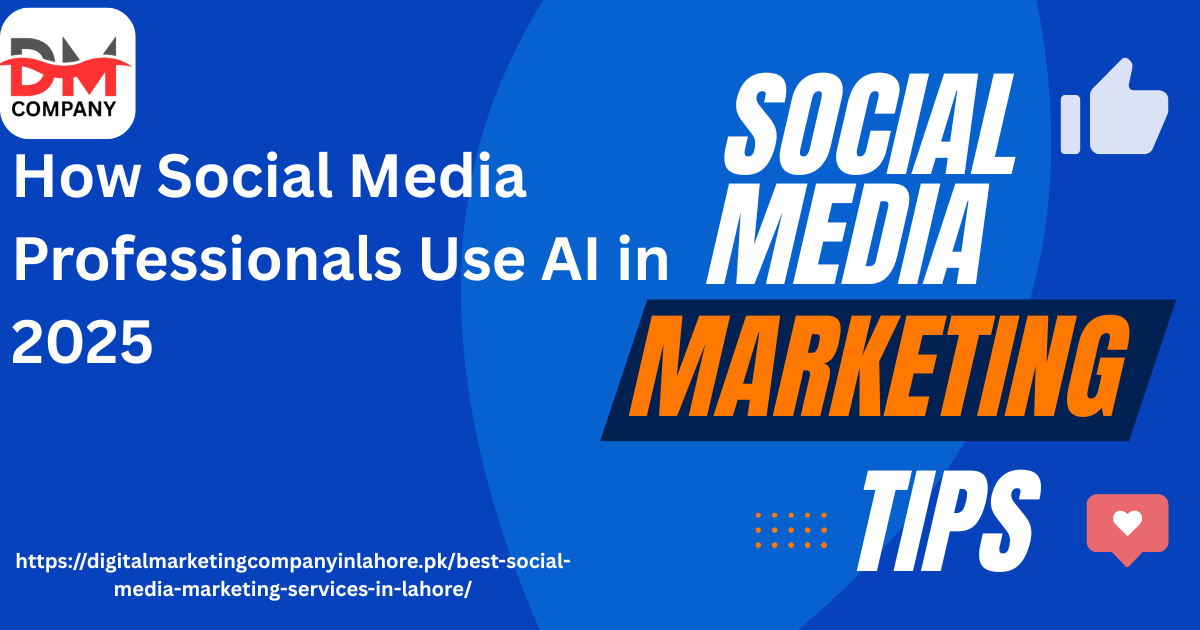customer engagement. As platforms evolve and user expectations rise, How Social Media Professionals Use AI in 2025 are turning to artificial intelligence (AI) to streamline tasks, improve results, and unlock new opportunities. By 2025, AI is no longer just an optional tool—it has become a necessity for social media managers, marketers, and content creators who want to stay competitive.
This article explores how social media professionals use AI in 2025, covering everything from content creation and analytics to customer engagement and brand strategy.
AI-Powered Content Creation
One of the biggest challenges for How Social Media Professionals Use AI in 2025 is producing fresh, engaging, and high-quality content consistently. AI tools now help automate parts of this process:
- Text Generation: Tools like GPT-based models write captions, blog snippets, hashtags, and ad copy in seconds. Marketers can generate multiple content variations and test what resonates best.
- Visual Creation: AI-driven design platforms create eye-catching images, banners, and even short-form videos tailored to each social media platform’s format.
- Video Editing: AI software automatically cuts long videos into bite-sized clips optimized for TikTok, Instagram Reels, and YouTube Shorts.
For example, a brand launching a new product can rely on AI to produce teaser graphics, write engaging captions, and schedule posts—saving hours of manual work.
Personalized Customer Engagement
In 2025, personalization is no longer a luxury—it’s an expectation. Social media professionals use AI to deliver customized experiences at scale:
- Chatbots & Virtual Assistants: AI-powered chatbots handle FAQs, process customer requests, and even recommend products based on browsing behavior.
- Sentiment Analysis: AI scans comments, mentions, and direct messages to detect customer emotions—helping brands respond quickly to negative feedback or amplify positive engagement.
- Recommendation Engines: Similar to e-commerce platforms, AI suggests content that individual users are most likely to interact with, improving relevance and engagement rates.
This means that customers no longer feel like they are engaging with a faceless brand; instead, they receive tailored responses and content that resonates with their preferences.
How Social Media Professionals Use AI in 2025
Data has always been the foundation of digital marketing, but the sheer volume of social media interactions can be overwhelming. AI is transforming analytics by:
- Predictive Insights: AI forecasts engagement trends, campaign performance, and audience behavior.
- Automated Reporting: Instead of manually creating reports, AI dashboards generate insights in real time with actionable recommendations.
- Competitor Benchmarking: AI tools scan competitor campaigns, compare engagement, and highlight areas for improvement.
For instance, a social media professional managing multiple brand accounts can instantly see which posts are likely to go viral and which campaigns need adjustment—without spending hours digging into spreadsheets.
How Social Media Professionals Use AI in 2025
AI-powered social listening allows professionals to monitor online conversations at scale. In 2025, this capability has expanded to predict future trends.
- Real-Time Monitoring: AI tracks mentions, hashtags, and keywords across multiple platforms.
- Trend Spotting: By analyzing millions of posts, AI detects emerging topics before they go mainstream.
- Crisis Management: AI alerts brands to potential PR issues, giving them time to respond before problems escalate.
For example, if a food brand notices growing conversations around “plant-based protein snacks,” AI can recommend campaign ideas or product launches aligned with that trend.
AI in Influencer Marketing
Influencer marketing remains a powerful tool in 2025, but identifying the right partners can be difficult. AI makes this easier by:
- Authenticity Checks: AI detects fake followers, engagement pods, or suspicious activity.
- Influencer Matching: Algorithms pair brands with influencers whose audiences align with campaign goals.
- Performance Forecasting: AI predicts how well an influencer’s campaign will perform based on historical data.
This ensures that social media professionals maximize ROI while building authentic influencer relationships.
Automating Scheduling and Campaign Management
Managing multiple platforms can be overwhelming. AI-driven scheduling tools now do more than just queue posts:
- Optimal Timing: AI calculates when target audiences are most active and posts automatically.
- Content Recycling: AI repurposes high-performing content for different platforms.
- A/B Testing: Campaigns are tested in real time, with AI adjusting strategies for maximum reach.
This level of automation frees social media managers to focus on strategy and creativity rather than repetitive tasks.
AI and Paid Advertising
Paid ads remain central to social media marketing, and AI now optimizes them with precision:
- Automated Bidding: AI adjusts bids in real time for the best ROI.
- Audience Targeting: Algorithms identify micro-segments of audiences most likely to convert.
- Creative Optimization: AI tests ad variations and scales winning formats automatically.
This means campaigns can run more efficiently, reduce wasted spend, and deliver stronger results.
Enhancing Brand Storytelling with AI
AI is also reshaping how professionals tell stories online:
- Narrative Analysis: AI evaluates past campaigns to understand what stories resonate most.
- Immersive Content: AI-generated AR and VR experiences bring interactive storytelling to platforms like Instagram and TikTok.
- Voice and Audio Content: AI creates voiceovers, podcasts, and even personalized audio ads.
Storytelling powered by AI helps brands connect emotionally with their audiences, strengthening loyalty and recognition.
AI for Accessibility and Inclusivity
Another major benefit of AI in 2025 is improving accessibility:
- Automated Captions: AI generates accurate captions for videos in multiple languages.
- Image Recognition: AI writes alt text for visually impaired audiences.
- Language Translation: Content can be instantly localized for global audiences.
This allows brands to expand their reach while making social media more inclusive for everyone.
The Ethical Side of AI in Social Media
While AI brings many benefits, social media professionals must also handle it responsibly:
- Transparency: Brands must disclose when content is AI-generated.
- Bias Reduction: AI tools should be trained on diverse datasets to avoid reinforcing stereotypes.
- Data Privacy: Customer data used by AI must be protected to maintain trust.
Ethical AI use ensures that automation enhances rather than undermines human creativity and trust.
Conclusio
In 2025, social media professionals are no longer just community managers or content creators—they are AI-powered strategists. From creating personalized experiences to predicting trends and automating campaigns, AI has transformed the way brands engage online.
The future of social media lies in collaboration between humans and machines: AI handles the heavy lifting of data, automation, and optimization, while professionals focus on creativity, storytelling, and building genuine human connections.
FAQs
1. How do social media professionals use AI for content creation?
They use AI tools to generate captions, design visuals, edit videos, and repurpose content for different platforms.
2. Can AI replace social media managers?
No. AI automates repetitive tasks and provides insights, but human creativity, empathy, and strategy remain irreplaceable.
3. How does AI improve customer engagement on social media?
AI chatbots, sentiment analysis, and personalized recommendations make customer interactions faster, more relevant, and more personal.
4. What role does AI play in influencer marketing?
AI helps identify authentic influencers, predict campaign outcomes, and ensure partnerships align with brand goals.
5. Is AI safe to use in social media marketing?
Yes, but brands must ensure ethical use—protecting data privacy, avoiding bias, and being transparent when content is AI-generated.
6. How does AI help with trend prediction?
AI analyzes massive amounts of data to detect emerging conversations, enabling brands to act before trends go mainstream.
7. What’s the future of AI in social media?
The future lies in deeper personalization, immersive storytelling (AR/VR), and advanced automation—empowering professionals to focus on strategy and creativity.

